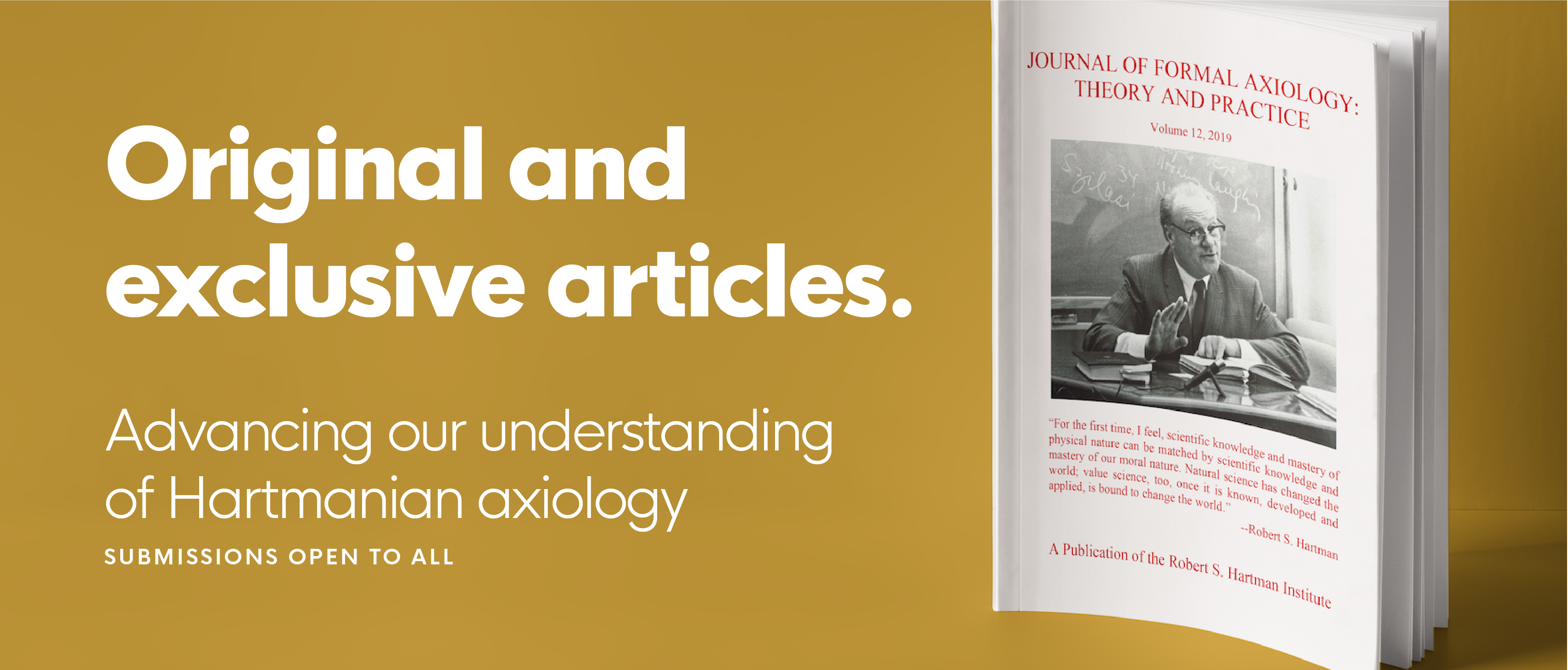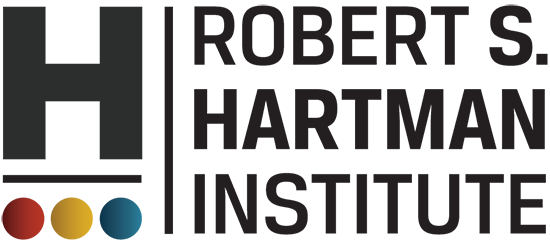
The Journal of Formal Axiology is published once a year, since 2008, by the Robert S. Hartman Institute.
Each edition is focused on advancing formal axiology and the value theory of Robert.S. Hartman and includes articles dealing primarily with axiological practice and application, as well as with theoretical issues.
Articles may be critical, constructive, creative, theoretical, or applied, and are focused on advancing our understanding of Hartmanian axiology and/or what can be done with it. All material is original and has not been published anywhere else. We hope you derive value from each publication and that you find them informative, enjoyable, intellectually challenging, or all the above.
All published issues of the Journals are complimentary to RSHI Members.
If you'd like to know more about becoming a RSHI Member, click here.
|
“For the first time, I feel, scientific knowledge and mastery of physical nature can be matched by scientific knowledge and mastery of our moral nature. Natural science has changed the world; value science, too, once it is known, developed and applied, is bound to change the world.”
— Robert S. Hartman
|
Each Journal is $25 for non-members. Click each link to purchase. A PDF download link will be provided after payment.
2024 - Volume 17, Journal of Formal Axiology - In this issue:
This year’s journal includes several empirical studies and philosophical exposés, showcasing the latest thinking around formal axiology. In addition, Cliff Hurst provided an original Hartman writing he found in the archives regarding enlightenment for our own time. The information shared in the journal is timely, if not timeless. The journal showcases new studies and thoughts. Some are original research that advances our knowledge in specific disciplines, while others synthesize concepts from other academics and relate them to formal axiology.
What's Inside:
- Robert S. Hartman, The Pressures from Philosophy and Psychology for Educational Reform
- C. Stephen Byrum, PhD, The Phenomenon of Value Capture: Implications for Robert S. Hartman’s Axiology
- Malcolm North, Saboteurs of Self-Actualization: Value Cognitions of Bias and Prejudice
- Clifford G. Hurst, The Iceberg Metaphor of Human Cognition
- Jonathan Ciampi and Helena Rouhe, Predicting Defense Mechanisms: A Comprehensive Analysis of Personality Traits and Values in Adult Behavioral Health
- Rem B. Edwards, Reconsidering Robert S. Hartman’s Formal Axiom of Axiology
The Journal is complimentary with your annual membership. Please login to download. For non-members, all issues of the Journal can be purchased for $25.00 per issue.
2023 - Volume 16, Journal of Formal Axiology - In this issue:
The latest Journal presents empirical studies on formal axiology, as well as theoretical and philosophical explorations. The contents are apropos given the current geopolitical climate. With the United States presidential election kicking off, conflicts in the Middle East and Ukraine, and other headlines, formal axiology provides some guidance for making sense of the news. This year's Journal features articles about leadership, value combinations, Hartman's Nobel Peace Prize nomination, and the ability to alter value structures. I hope you enjoy each author's contribution.
What's Inside:
- Jonathan S. Ciampi, on "A Review of Robert S. Hartman's 1973 Nobel Peace Prize Nomination"
- Rem B. Edwards on "Increases in Old and New Properties in Value Combinations"
- Megan Weikauf on "Toward Understanding Mental Drivers of Leadership Behaviors"
- Jonathan S. Ciampi on "Analyzing 1973 Nobel Peace Prize and War through Hartman's Theories"
- Ethan Dunbar and Malcolm North on "Examining the Leadership Ethics of Elected Officials"
- Janine Rodiles-Hernández on "Applicability of The Hartman Value Profile to Measure Cognitive-Behavioral Changes in a Longitudinal Study with Pre-Post Design"
The Journal is complimentary with your annual membership. Please login to download. For non-members, all issues of the Journal can be purchased for $25.00 per issue.
2022 - Volume 15, Journal of Formal Axiology - In this issue:
Imagine a one-room house with several doors on each side. There are no windows. You cannot see inside. And the doors are all locked. You don’t have a key. Yet, somehow, you intuit that if you could only get inside, then you would find there some valuable new insight about the theory and practice of formal axiology. Now, imagine that someone walks up to you and hands you a key ring with a hundred keys on it. A dozen doors; a hundred keys. At least one of those keys, for sure, will unlock one of those doors for you. A different key may unlock a different door for someone else.
That’s how the editor sees this issue of the Journal. Formal axiology is difficult to comprehend. Yet, the more insight you gain, the clearer becomes your understanding of it. The authors of articles in this issue have provided us with at least a hundred keys by which we may each further our understanding of this theory and its practice.
- Clifford Hurst, The Great Resignation—An Axiological View
- Rem B. Edwards, Axiological Values In Natural Scientists And The Natural Sciences
- Bob Smith, A More Comprehensive Scoring Of Axiological Profiles
- Gilberto Carrasco Hernández, Impact Of The “Orientation Based On Formal Axiology”
- Rem B. Edwards, Robert Hartman and Brand Blanshard On Reason, Moral Relativism, And Intrinsic Goodness
- Robert S. Hartman, A Moral Science For The Atomic Age
2021 - Volume 14, Journal of Formal Axiology - In this issue:
This year’s Journal reflects the wide variety of people who are studying and applying formal axiology in the world today and it reflects the depth of their knowledge and their intellectual rigor.
- Rem B. Edwards, Axiology and Spirituality
- Peter Kizilos-Clift, The Conference That May Still Save the World: Robert S. Hartman, Abraham H. Maslow, and The Seeds of Conscious Evolution
- Amanda G. Jaimes-Bautista and Fernanda Zenizo, A Longitudinal Study of Evaluative Patterns of Education Personnel: An Axiological Perspective
- Shannon Clowney Johnson and Malcolm North, The Good, the Bad, and the Toxic: Profile of Unethical Leaders
- Robert S. Hartman, Ethics and Economics
- Various members of the Robert S. Hartman Institute, Dialogues on Axiological Theory
2020 - Volume 13, Journal of Formal Axiology - In this issue:
A theme emerged as this volume of the Journal of Formal Axiology started to come together. The theme became that of illustrating the evolution of Hartman’s lifelong quest to develop a science of values and valuation. At the core of his quest, of course, was his
development of the theory of formal axiology. But formal axiology does not stand on its own as a full-fledged science of values. It needs something more. What that something “more” consists of became the theme of this issue of the Journal. We hope you find it interesting, insightful, and informative.
- C. Stephen Byrum, The Hartman Dissertation: A “Portal” to Hartman’s Formal Axiology
- Robert S. Hartman, Preface to Hartman’s Dissertation: Can Field Theory be Applied to Ethics?
- Leonardo Gómez-Navas Chapas, The Unified Science of Value and Teleological Value
- Malcolm North, Freedom from Prejudice: The Value Creation Path to Human Flourishing
- Clifford G. Hurst, The Role of the Situation in Hartman’s Thought
- Robert S. Hartman, My Work
2019 - Volume 12, Journal of Formal Axiology - In this issue:
The articles in the 2019 issue of the Journal of Formal Axiology exemplify the depth and breadth of intellectual rigor of members of this Institute. We continue in this issue a practice we began in 2017, which is to publish, regularly, some piece of Hartman’s own writings. Hartman was a prolific writer, but much of what he wrote was never published. Many of his writings that were published deserve a new audience.
- Robert S. Hartman, Four Axiological Proofs of the Infinite Value of Man
- Rem B. Edwards, Axiological Reflections on Infinite Human and Divine Worth
- Malcolm North, Value Judgment: The Silent Driver of Personality and Behavior
- Anthony Nicoletti, It Takes All Kinds: Scoping Leader Experience and Development with the Hartman Value Profile
Each Journal is $25 for non-members. Click each link to purchase. A PDF download link will be provided after payment.
2018 - Volume 11, Journal of Formal Axiology - In this issue:
- Samples of Hartman’s previously unpublished work: Lectures IV and V from a series lectures Hartman delivered about his work,
- Learn the backstory of Hartman’s time spent at MIT as Historian Peter Kizilos-Clift shares about Hartman’s role in helping MIT confront, in the nuclear age, an assumption widely held among many scientists that science is—and should be—value neutral.
- See how machine learning can better analyze degrees of extrinsic value than Hartman was able to do using Pascal’s Triangle, shared by former Hartman doctoral student Mark A. Moore and co-author Hong Zhang,
- Follow along as frequent contributor Gilberto Hernández Carrasco continues his discussion (from previous issues 2011 and 2014) about applications of formal axiology to human development. In this article, Gilberto proposes a quality model for the management of the Evangelical Christian Church using formal axiology
2017 - Volume 10, Journal of Formal Axiology - In this issue:
From the Archives:
-
Robert S. Hartman, Lecture I: Value as a Scientific Object
-
Robert S. Hartman, Lecture II: The Concept of the Science of Value
-
Robert S. Hartman, Lecture III: The Axiom of Value: What is Goodness?
Articles:
-
Douglas C. Lawrence and Rem B. Edwards, Dialogue on HumanGoodness and Good-Making Properties
-
C. Stephen Byrum, Counterfactual Emotions and “Undoing”: The Kahneman/Hartman Discussion
-
Gilberto Carrasco Hernández, Applying Axio-Orientation to Facilitate Recovery in Alcoholics and Persons with Personality Disorders
-
Malcolm North, Toward a Value Theory Model of Critical Judgment
2016, Volume 9, Journal of Formal Axiology - In this issue:
- Rem B. Edwards, Identification Ethics and Spirituality
- Gary J. Acquaviva, An Axiological View of Karma
- Adina Bortă, A Better World is Possible: Exploring How Valuing Nature Intrinsically Enriches All Life
- Mark A. Moore, Axiological Thinking: Modes of Thought
- C. Stephen Byrum, Beyond Phenomenology: The Movement toward Axiology
- Giberto Carrasco Hernàndez, Christian Ethics, Formal Axiology, and Human Development Book Review Clifford G. Hurst, A Review of Susan Wolf’s Meaning in Life and Why it Matters
- Memorial Tributes to Leon Pomeroy
2015, Volume 8, Journal of Formal Axiology - In this issue:
- Adina Bortă, Axiometric and Psychological Structure of Empathy
- Stephen Byrum, The Influence Of Russell L. Ackoff: Through The Lens of the Hartman Value Profile
- Malcolm North, Congruent and Incongruent Selves: Exploring the Structure of Authenticity
- Pamela Brooks, Resilience, How Good People Conquer Tough Situations: An Axiological Perspective
- Axiology and EvilArthur R. Ellis, “What is ”
- Clifford Hurst and Amora Rama, Does Evil Prevail Over Goodness?
- Gary J. Acquaviva, Assessing the Valuation Imbalance of Criminal Personalities
- From the Archives: Rita Hartman, On the Death of Robert S. Hartman
- Robert S. Hartman, Fundamental Terms in Ethics
- Eunice Forrest and Others, Memorial Tributes to Frank G. Forrest
2014, Volume 7, Journal of Formal Axiology - In this issue:
- Clifford G. Hurst, The Intentions of Axiological Interpreters
- K.T. Connor, Axiology’s Advantage: Reflections on Selection Assistance
- Jay Morris, Self-Awareness and Self-Development as Key Drivers in Leadership Development Practices
- Ron van de Water and Andre Tjoa, Prevention of Stagnation in Work and Career: Axiometrics Applied to the Concept of Stagnation
- C. Stephen Byrum, The Art of Copying
- Leon Pomeroy, My Discovery of Hartman and the HVP
- Gilberto Carrasco Hernandez, The Technology of Organizational Human Development
- Detlef Duwe and Marit Hoppner, Profiling Change: The challenge of Finding Suitable Change Drivers for Change
- Memorial Tributes to David Mefford
2013, Volume 6, Journal of Formal Axiology - In this issue:
- Malcolm North, Realizing a Vision for Global Values Education
- Ulrich Vogel, Exploring the Hartman Archives
- Stephen C. Byrum, Chasing After Pi: A Re-interpretation of “Why?”
- Douglas C. Lawrence, A Proposed Fourth Atmospheric Dimension of Value
- Gilberto Carrasco Hernández, Introducing Formal Axiology to Junior High School and Special Education Directors in Mexico
- K. T. Connor, Measuring Ethical Climate in an Organization: Aligning for Excellence
- Vera Mefford, Values Education: Axiology and Process Ethics
- Leon Pomeroy, To Be Or Not To Be: The Self, Continued: “No Man is an Island”
- Robert Short, The Globalization of Value Theory Mathematics
- David Mefford, The Structure of Valuation – Becoming A Values Architect
2012, Volume 5, Journal of Formal Axiology - In this issue:
- Leon Pomeroy and Contributors, Historical Timeline of the Robert S. HartmanInstitute
- Gilberto Carrasco Hernández, Creating the Hartman Value Profile (HVP)
- In Memory of Mario Cárdenas Trigos
- C. Stephen Byrum, Articulating Human Consciousness: An Axiological Approach
- Jim Weller, Taming the Beast by Declawing the Systemic
- Frank G. Forrest, Good and Value Synonymity
- Leon Pomeroy, Babson’s Boulders Concluded
- Marcos Gojman, Axiologics: A New Calculus of Value
- Gary G. Gallopin, The Baby or the Bathwater? The Role of Transfinite Mathematics in the Nascent Hartman Science
- Rem B. Edwards, Gallopin’s Mistakes
- Mark A. Moore, Reply to Gallopin’s “The Baby or the Bath Water?”
- Ted Richards, The Structure of Valuation: A Short Technical Reply to Gallopin
- David Mefford, Review of Gary Gallopin’s Article
- Pam Brooks, Cliff Hurst’s Dissertation on Entrepreneurship
2011, Volume 4, Journal of Formal Axiology - In this issue:
- Clifford G. Hurst, The Non-mathematical Logic of a Science of Values
- C. Stephen Byrum, A Unified Field Theory of Motivation: Based on the work of Robert S. Hartman
- Gilberto Carrasco Hernández, The Axiological Process for Making Good Students in a University Context
- Leon Pomeroy, Babson’s Boulders: A Heuristic Exploration of the dimensions of Value
- K. T. Connor, Collaborative Problem Solving Through the Lens of Value Science
- Ulrich Vogel, HVP Projection: Job Matching with Profiling Values
- Wayne Carpenter, An Axiological Meaning of “The Self”
- David Mefford, Expanded Axiological Diagnostics for the HVP
- John A. Anderson, The Purple Cow: Marketing and Axiology
2010, Volume 3, Journal of Formal Axiology - In this issue:
- Jim C. Weller, Hartman Meets Chukuhmeh
- Richard C. Leggett, The Axiological Structures of Buddhism: Toward an Understanding of Mult-dimensional Valuation
- Jeremy Boone, Applying Axiological Profiles in Sport and Business
- C. Stephen Byrum, The Hartman–Allport Connection
- David Mefford, Origins of Formal Axiology in Phenomenology and Implications for a Revised Axiological System
- Gilberto Carrasco, The Organization of Personality and the Articulation of Good in the Axio-Orientation Process
- Ted Richards, The Difficulties of a Hartmanesque Value Calculus
- Skye Hirst, Value-Intelligence in All Creative Organisms
- Gary G. Gallopin, Introducing Beyond Perestroika: Axiology and the New Russian Entrepreneurs
- Cliff Hurst, A Review of Gary Gallopin’s Beyond Perestroika: Axiology and the New Russian Entrepreneurs
- Forthcoming: Rem B. Edwards, The Essentials of Formal Axiology
2009, Volume 2, Journal of Formal Axiology - In this issue:
- Rem B. Edwards, Editor’s Page: Is Axiology a Science?
- Kevin Wolfe, The Axiological Roots of Employee Engagement
- Stephen C. Byrum, Exploring the Important Power of Focus
- Jay Niblick, The Role of Axiological Self-Awareness in Peak Performance
- K. T. Connor, Innovation: An Axiological and OD Exploration
- Bill Pavelich, Axiological Intervention with Christian Leaders: Two Case Studies
- Cliff Hurst, A Meaningful Score: Hartman v. Rokeach
- Thomas M. Dicken, Intrinsic Value and Some of Its Alternatives
- David Mefford, Formal Axiology, Philosophy or Science?
- James C. Weller, Why Not Fractal Geometry?
- Rem B. Edwards, Transfinite Mathematics, and Axiologyas a Future Science
2008, Volume 1, Journal of Formal Axiology - In this issue:
- Rem B. Edwards, Editor’s Page: What is Formal Axiology?
- Stephen C. Byrum, A Bushel and A Peck: Robert S. Hartman’s
- Axiology and Transfinite Mathematics
- David Mefford, Vera Mefford, Jeremy Boone, Mike Hartman, Leonard Wheeler, and Gregory Woods, Sports Axiology
- Thomas M. Dicken, A Suggested Context for Axiology
- Michael H. Annison, Organizing for Good
- Rem B. Edwards, Know Thyself; Know Thy Psychology
- Leon Pomeroy, HVP Scores and Measures Employed in Medical School Admissions
- DISCUSSIONS
- Byrum’s “Bushel and A Peck”
- Jim C. Weller, For Everything There Is a Season: Mathematics, Hierarchy, and the Puzzle of Hartman’s Shining Vision
- Applying Axiological Calculuses to “Killing to Save Lives”
- Frank G. Forrest, Is Killing to Save Lives Justifiable?
- Mark A. Moore, Killing to Prevent Murders and Save Lives
- Ted Richards, Killing One to Save Five: A Test of Two
- Hartman-style Value Calculuses

ARE YOU INTERESTED IN CONTRIBUTING TO A FUTURE JOURNAL?
If you'd like to contribute to a future Journal contact our VP of Research, Cliff Hurst, [email protected].
|
“I thought to myself, if evil can be organized so efficiently [by the Nazis] why cannot good? Is there any reason for efficiency to be monopolized by the forces for evil in the world? Why have good people in history never seemed to have had as much power as bad people? I decided I would try to find out why and devote my life to doing something about it.”
— Robert S. Hartman
|
|


